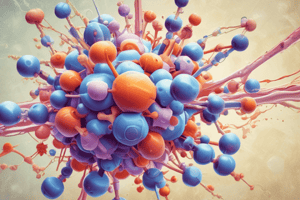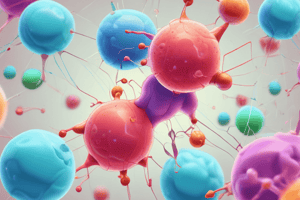Podcast
Questions and Answers
Which of the following is true about the structure of antibody molecules?
Which of the following is true about the structure of antibody molecules?
- Antibody molecules only come in four types or classes: IgG, IgM, IgD, and IgE.
- The specificity of an antibody molecule is inherent in the constant region, which is made up of the variable regions of both the heavy and light chains.
- Antibody molecules have variable and constant regions, with the constant regions being where the antigen binds.
- Antibody molecules are made up of two heavy chains and two light chains bonded together by intermolecular forces. (correct)
Which of the following is NOT one of the five types or classes of antibody molecules?
Which of the following is NOT one of the five types or classes of antibody molecules?
- IgC (correct)
- IgM
- IgD
- IgG
What are isotypes in antibody molecules?
What are isotypes in antibody molecules?
- Unique amino acid positional changes in the constant regions of both the light and heavy chains of immunoglobulin molecules.
- Unique epitopes or determinants specific to the classes and subclasses of heavy chains and types of light chains. (correct)
- Unique amino acid positions recognized on the variable regions of heavy chains.
- Epitopes of unique amino acids that are prevalent throughout the constant regions of heavy and light chains.
What is the difference between isotypes and allotypes in antibody molecules?
What is the difference between isotypes and allotypes in antibody molecules?
What are idiotypes in immunology?
What are idiotypes in immunology?
What is the role of idiotypes in immune regulation?
What is the role of idiotypes in immune regulation?
What are anti-idiotypic vaccines?
What are anti-idiotypic vaccines?
What is targeted therapy in immunology?
What is targeted therapy in immunology?
What is the importance of allotypes in transplantation biology?
What is the importance of allotypes in transplantation biology?
Which of the following is true about the structure of antibody molecules?
Which of the following is true about the structure of antibody molecules?
Which of the following is NOT one of the five types or classes of antibody molecules?
Which of the following is NOT one of the five types or classes of antibody molecules?
What are isotypes in antibody molecules?
What are isotypes in antibody molecules?
What is the difference between isotypes and allotypes in antibody molecules?
What is the difference between isotypes and allotypes in antibody molecules?
What are idiotypes in immunology?
What are idiotypes in immunology?
What is the role of idiotypes in immune regulation?
What is the role of idiotypes in immune regulation?
What are anti-idiotypic vaccines?
What are anti-idiotypic vaccines?
What is targeted therapy in immunology?
What is targeted therapy in immunology?
What is the importance of allotypes in transplantation biology?
What is the importance of allotypes in transplantation biology?
Which of the following is true about antibody molecules?
Which of the following is true about antibody molecules?
What are the five types or classes of antibody molecules?
What are the five types or classes of antibody molecules?
What are isotypes in antibody molecules?
What are isotypes in antibody molecules?
What is the difference between isotypes and allotypes in antibody molecules?
What is the difference between isotypes and allotypes in antibody molecules?
What are idiotypes in immunology?
What are idiotypes in immunology?
What is the role of idiotypes in immune regulation and clinical applications?
What is the role of idiotypes in immune regulation and clinical applications?
What is the difference between allotypes and idiotypes in immunology?
What is the difference between allotypes and idiotypes in immunology?
What is the checkpoint that determines which parent's alleles are expressed in the offspring?
What is the checkpoint that determines which parent's alleles are expressed in the offspring?
What is the specificity of the immune response inherent in?
What is the specificity of the immune response inherent in?
Flashcards are hidden until you start studying
Study Notes
Understanding Antibody Molecules and Isotypes
-
Antibody molecules are long polypeptide chains made up of two heavy chains and two light chains bonded together via intra disulfide bonds and inter chain bonding.
-
Antibody molecules have variable and constant regions, with the variable regions being where the antigen binds.
-
The specificity of an antibody molecule is inherent in the antigen binding region, which is made up of the variable regions of both the heavy and light chains.
-
Antibody molecules come in five types or classes: IgG, IgM, IgD, IgE, and IgA.
-
Each type of antibody class has unique epitopes or isotypes, which are epitopes unique to the classes and subclasses of heavy chains and types of light chains.
-
Isotypes are unique amino acid positions recognized on the heavy chains, which are the mu (M) chain for IgM, gamma (G) chain for IgG, alpha (A) chain for IgA, epsilon (E) chain for IgE, and delta (D) chain for IgD.
-
Antibody molecules are inherited from our parents, making us immunological mosaics.
-
The specificity of an immune response is inherent in the antigen binding region of the antibody molecule.
-
The antigen drives the immune response.
-
Rabbits can be immunized with human IgM to generate an antiserum that reacts with all five classes of human antibodies.
-
Isotyping experiments involve neutralizing the rabbit antiserum to only react with IgM, which identifies the unique determinants specific to the heavy chain.
-
Isotyping helps us understand the unique epitopes that characterize the classes and subclasses of heavy chains and types of light chains.Understanding Isotypes and Allotypes in Antibody Molecules
-
Isotypes are unique determinants on the constant regions of heavy and light chains in antibody molecules.
-
Isotypes are present in all immunologically normal individuals and can be used to measure antibody levels and assess immune competency.
-
Multiple myeloma is a B-cell tumor that produces a homogeneous population of IgM antibodies, which can be detected by looking for isotypes.
-
Isotypes are located in the constant regions of antibody molecules and can be used to bind to antigens or epitopes.
-
Allotypes are unique amino acid positions in the constant regions of heavy and light chains in antibody molecules.
-
Allotypes occur in each person and depend on the genes inherited from the mother and father.
-
Allotypes are different from isotypes because they are unique to each individual and can be recognized by other immune systems.
-
Allotypes occur due to co-dominant autosomal genetics, where alleles from both parents compete for expression.
-
Allelic exclusion is the checkpoint that determines which parent's alleles are expressed in the offspring.
-
Multi-parous women and whole blood transfusions are sources of anti-allotype antibodies.
-
Allotypes are important in transplantation biology, as they can be recognized as foreign by the immune system.
-
Understanding isotypes and allotypes is fundamental to understanding the structure and function of antibody molecules in immunology.Understanding Allotypes and Idiotypes in Immunology
-
Allotypes are unique amino acid positional changes in the constant regions of both the light and heavy chains of immunoglobulin molecules.
-
Isotypes are epitopes of unique amino acids that are prevalent throughout the constant regions of heavy and light chains.
-
Allotypes are co-dominantly expressed genes that are unique to each individual.
-
The immune system regulates antibody production by monitoring unbound antibodies in the idiotypes, which are energetic determinants present on individual antibody molecules.
-
Idiotypes are located in the hypervariable regions of antibody molecules, which are the physical docking sites for antigens.
-
The specificity of the immune response is inherent and embedded within these hypervariable regions, which are also called the variable region markers.
-
Allotypes are important in transplantation biology as they are used to identify immunological matches between donors and recipients.
-
Allotypes can be measured in semen and dry blood and are useful in forensic medicine for tracing individuals.
-
Bone marrow transplants can be monitored by looking for the allotypes of the donor in the host.
-
Idiotypes are important in laboratories for identifying how immune responses are being regulated.
-
The immune system regulates antibody production by generating anti-idiotypic antibodies that positively or negatively regulate the secondary antibody.
-
The specificity of the immune response is monitored by the idiotypes, which are unique to each individual and are located in the hypervariable regions of antibody molecules.The Role of Idiotypes in Immunobiology and Clinical Applications
-
Antibodies are proteins produced by the immune system to neutralize pathogens.
-
Idiotypes are unique structures within antibodies that can be used to identify and regulate immune responses.
-
Allotypes and isotypes are other types of antibody variations that can also impact immune function.
-
Idiotype regulation is important for maintaining a balanced immune response and preventing autoimmune diseases.
-
Vaccines work by stimulating the production of specific antibodies against a pathogen.
-
Anti-idiotypic vaccines are being developed that use antibodies to stimulate immune responses without the need for antigens.
-
Anti-idiotypic antibodies have been used successfully in cancer treatment, particularly for B cell tumors.
-
B cells have unique idiotypes on their receptors that allow them to recognize and respond to specific antigens.
-
Malignant B cells can produce non-functional antibodies that crowd out normal B cells and cause disease.
-
Targeted therapy can be used to kill off malignant B cells by targeting their specific idiotypes.
-
Immunobiology is a complex field with many intricate mechanisms and constructs.
-
Understanding the role of idiotypes in immune regulation and clinical applications can lead to more effective treatments for diseases.
Studying That Suits You
Use AI to generate personalized quizzes and flashcards to suit your learning preferences.




